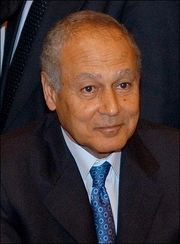Egypt wants end to 'nuclear double standards'
Mon Dec 25 2006
AFP
 |
| Egyptian Foreign Minister Ahmed Abul Gheit, seen here on 17 December 2006, called for an end to nuclear double standards, after the United Nations imposed sanctions on Iran for refusing to halt uranium enrichment. (AFP/File/Yasser al-Zayyat) |
Egyptian Foreign Minister Ahmed Abul Gheit called for an end to nuclear double standards, after the United Nations imposed sanctions on Iran for refusing to halt uranium enrichment.
"The negligence of certain Western countries over questions of non-proliferation, and the fact that they permit some states to acquire a nuclear capacity while preventing others from doing so, is nothing but double standards," the foreign minister said in a statement.
"That must stop," he added. "It is known that Israel has a nuclear capability that is not subject to any control by the International Atomic Energy Agency," the United Nations' nuclear watchdog in Vienna.
Israel has never officially admitted having nuclear weapons, but it is not a signatory to the Nuclear Non-proliferation Treaty, and refuses to allow international inspections of its Dimona nuclear facility.
"The fact that some countries obtain peaceful nuclear technology, that they master some steps in making nuclear fuel ... does not in any way mean they can be deemed to be 'nuclear countries,' because nuclear countries are those that have military nuclear capabilities," the Egyptian foreign minister said.
Iranian President Mahmoud Ahmadinejad defiantly declared Iran "a nuclear country ... whether the West likes it or not" after the UN Security Council on Saturday voted unanimously to impose sanctions on Iran's nuclear industry and ballistic missile programme.
Iran is suspected of secretly developing nuclear weapons, but its Islamic government insists that its nuclear programme is for civilian purposes only and that it will keep expanding its uranium enrichment capability.
Egypt recently revived its civilian nuclear programme after a 20-year freeze, with hopes of building a nuclear power station by 2020.

